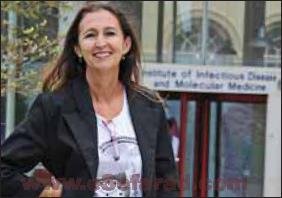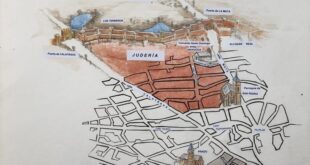
Internationally recognised scientist Prof Valerie Mizrahi (pictured), has been appointed director of the Institute of Infectious Disease and Molecular Medicine at UCT, the latest honour in a career littered with awards and accolades.
Mizrahi grew up in former Salisbury, Zimbabwe and studied at UCT, where she graduated with a PhD in chemistry in 1983.
She has strong Jewish roots, being a Sephardi whose family is from Rhodes Island. “I grew up with a very, very strong sense of Sephardi Jewish heritage in Zimbabwe, which had a very strong Sephardi community,” she told Jewish Report.
“I grew up hearing Ladino, the Spanish that was spoken on Rhodes Island, and the food and the language became part of my culture.
Everything about being a Sephardi Jew was and is very important to me – I’ve tried to give some of that sense to my daughters.”
Her father, Morris, is in fact the honorary life president of the Johannesburg Sephardi Hebrew Congregation, with both parents being “hugely involved” in the shul.
As a scientist of international repute, Mizrahi could have had the world at her feet, yet she has chosen to remain in South Africa.
“A key decision in my life to come back in 1989 was largely driven by family,” she says of her return from the United States where she had completed a post-doctoral fellowship and worked at SmithKline and French Research and Development in Philadelphia.
“I knew I wanted to have children and I really wanted my kids to grow up with grandparents nearby and I have absolutely no regrets about that. As a scientist, I’ve got no regrets either because I think it comes down to a question of relative impact and I believe I was and am able to have more of that here than I could have had had I chosen to continue my career in the US.”
In terms of her personal research, which focuses exclusively on tuberculosis, she is well-placed. TB rates in sub-Saharan Africa are “through the roof”, she says, driven and fuelled to a large extent by the co-epidemic with HIV, with the latter being the most significant risk factor for the development of both primary and post-primary TB.
“This is a problem of the developing world and I would like to be part of a movement that shifts the centre of gravity of the research and the setting of the research agenda to the south where the problem actually exists.
I’m seeing trends of such a shift happening and I’m glad to be part of that.”
Mizrahi is passionate about affirmative action for black and women scientists in a field that has traditionally been dominated by white males. “I’ve always had a lab that’s been dominated by women – I’ve always been sensitive to it and always wanted to do it.
“In a way, it was almost leading by example. I think what I tried to show was that you could be a woman scientist and raise a family at the same time. I’m not saying that any of this was easy,” she adds, “and it could never have been possible without extraordinary family support and work support as well. My mom has been an amazing grandmother who was able to step in when I was travelling for three to four months of the year, to help with the kids, do the afternoon lift schemes…
“A lot of the women who’ve worked for me have had their families while they’ve worked for me. We used to laugh at one point where we thought that we were producing more babies than publications!”
She admits her maternal instincts do shine through in the lab. “Sometimes I just call myself a Jewish mom when I’m coming down on my students. That’s the way I was raised and will continue to be as a scientist.”
Mizrahi stresses that she is “absolutely committed” to the notion of transformation at all levels. “I believe that it’s imperative.
“If one finds black students, we need to find every mechanism to support and encourage them because as an institute that aims to have an Africa-wide footprint, this is critically important.
“I’m very honoured by the appointment and hope I can do this job justice,” the Arated scientist says modestly.
MOIRA SCHNEIDER
CAPE TOWN
Source: SA Jewish Report Vol. 15 25FEB-04MAR 2011
 eSefarad Noticias del Mundo Sefaradi
eSefarad Noticias del Mundo Sefaradi

